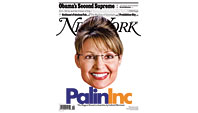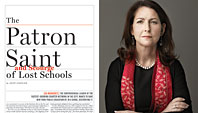
1. Gabriel Sherman’s investigation into the monetization of Sarah Palin (“The Revolution Will Be Commercialized,” May 3) generated hundreds of comments on nymag.com and sparked a cross-blog debate about the viability of a Palin-led ticket in 2012. “This article makes clear that, were there any doubt, her preoccupying concern is ‘building her brand’—less in a political sense than a financial one,” wrote Josh Green on his blog at the Atlantic. “Palin may yet make a bid for the White House. But all evidence suggests that when the time comes to choose between earning money and running for president, Palin will choose money.” R.L.G. at the Economist’s Democracy in America blog was less convinced by Green’s argument: “Why make all this money? One answer is to be rich, but another, at least plausible for a figure like Palin, is to be able to run for president … Being rich isn’t sufficient to win the presidency, but it sure helps.” And Green’s Atlantic colleague Andrew Sullivan, citing Sherman’s stats on wealthy Fox-watching Americans, noted: “With that power and that potential funding, how can someone who said she wanted to be president as long ago as 1996 resist? She is the biggest political power after Obama in this country.”

2. The high-octane arguments over charter-school administrator Eva Moskowitz discussed in “The Patron Saint (and Scourge) of Lost Schools” (by Jeff Coplon, May 3) continued on nymag.com. “No matter how you look at it, Harlem Success is a better school” than neighboring P.S. 149, wrote one commenter. “Maybe not perfect, but that is a small price to pay for high-level education.” Another agreed: “This school is providing [students] with exactly what their lives are lacking most: a firm hand from someone who they can model to find success in their academic lives.” Others took issue with the network and its emphasis on test preparation. “Yes, all schools spend some time on test prep, but [Harlem Success Academy] goes too far … Are students here really learning or are they just becoming test-taking machines?” A self-identified former teacher at Moskowitz’s Success Charter Network disputed her assertion that students spent only ten minutes a day on test prep (“Totally untrue. Try two hours”), and focused on the Network’s policy toward disabled students. “They counsel children with learning disabilities and behavioral difficulties out [of the school] because they do not want their test scores affected. It is beyond shocking, and morally disgusting.” Others criticized Paul Fucaloro, Harlem Success’s director of instruction, who was quoted by Coplon as saying, “I’m not a big believer in special ed.” Fucaloro wrote in to clarify his position, noting he supports special education but objects to how it’s often applied: “In my 43 years of teaching in the NYC public-school system, what has upset me … is when the term special education is interpreted as ‘cannot learn’ and ‘let’s lower the bar.’ ”
3. Alan Rich, this magazine’s first and long-standing music critic, died on April 23, at the age of 85. You could tell that he was no ordinary classical-music writer from his very first column, in New York’s inaugural issue (April 8, 1968): He argued, playfully, that Leonard Bernstein’s successor at the Philharmonic should be the Beatles. “If we assume, easy enough, the current doldrums in the symphonic repertory, the crying need for some major breakthrough to enliven the experience of concertgoing … I give you Ringo, Paul, John, and George as a perfectly viable way out, with a few guest conductors now and then for Beethoven. About the only drawback I can see is that The Beatles record for Capitol and the Philharmonic is under contract to Columbia, and that’s hardly a major hangu
Send correspondence to: comments@nymag.com